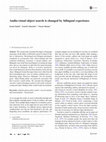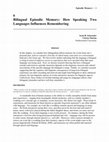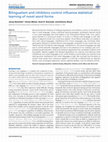Papers by Scott Schroeder

International Journal of Bilingualism, 2017
Aims and objectives: The objectives of the present research were to examine the cognitive consequ... more Aims and objectives: The objectives of the present research were to examine the cognitive consequences of trilingualism and explain them relative to the cognitive consequences of bilingualism. Approach: A comparison of cognitive abilities in trilinguals and bilinguals was conducted. In addition, we proposed a cognitive plasticity framework to account for cognitive differences and similarities between trilinguals and bilinguals. Data and analysis: Three aspects of cognition were analyzed: (1) cognitive reserve in older adults, as measured by age of onset of Alzheimer's disease and mild cognitive impairment; (2) inhibitory control in children and younger adults, as measured by response times on behavioral Simon and flanker tasks; and (3) memory generalization in infants and toddlers, as measured by accuracy on behavioral deferred imitation tasks. Results were considered within a framework of cognitive plasticity, which took into account several factors that may affect plasticity including the age of learning a third language and the extent to which additional cognitive resources are needed to learn the third language. Findings: A mixed pattern of results was observed. In some cases, such as cognitive reserve in older adults, trilinguals showed larger advantages than did bilinguals. On other measures, for example inhibitory control in children and younger adults, trilinguals were found to exhibit the same advantages as bilinguals. In still other cases, such as memory generalization in infants and toddlers, trilinguals did not demonstrate the advantages seen in bilinguals. Originality: This study is the first comprehensive analysis of how learning a third language affects the cognitive abilities that are modified by bilingual experience, and the first to propose a cognitive plasticity framework that can explain and predict trilingual-bilingual differences. Significance: This research shows that the cognitive consequences of trilingualism are not simply an extension of bilingualism's effects; rather, trilingualism has distinct consequences, with theoretical implications for our understanding of linguistic and cognitive processes and their plasticity, as well as applied-science implications for using second and third language learning in educational and rehabilitative contexts to foster successful cognitive development and aging.

Recent research suggests that bilingual experience reconfigures linguistic and nonlinguistic cogn... more Recent research suggests that bilingual experience reconfigures linguistic and nonlinguistic cognitive processes. We examined the relationship between linguistic competition resolution and nonlinguistic cognitive control in younger and older adults who were either bilingual or monolingual. Participants heard words in English and identified the referent among four pictures while eye-movements were recorded. Target pictures (e.g., cab) appeared with a phonologi-cal competitor picture (e.g., cat) and two filler pictures. After each eye-tracking trial, priming probes assessed residual activation and inhibition of target and competitor words. When accounting for processing speed, results revealed that age-related changes in activation and inhibition are smaller in bilinguals than in monolinguals. Moreover, younger and older bilinguals, but not monolinguals, recruited similar inhibition mechanisms during word identification and during a nonlinguistic Stroop task. Results suggest that, during lexical access, bilinguals show more consistent competition resolution and recruitment of cognitive control across the lifespan than monolinguals.
Applied Linguistics, 2015

Attention, Perception, & Psychophysics, 2015
The current study examined the impact of language experience on the ability to efficiently search... more The current study examined the impact of language experience on the ability to efficiently search for objects in the face of distractions. Monolingual and bilingual participants completed an ecologically-valid, object-finding task that contained conflicting, consistent, or neutral auditory cues. Bilinguals were faster than monolinguals at locating the target item, and eye movements revealed that this speed advantage was driven by bilinguals' ability to overcome interference from visual distractors and focus their attention on the relevant object. Bilinguals fixated the target object more often than did their monolingual peers, who, in contrast, attended more to a distracting image. Moreover, bilinguals', but not monolinguals', object-finding ability was positively associated with their executive control ability. We conclude that bilinguals' executive control advantages extend to real-world visual processing and object finding within a multi-modal environment.
The relationship between activation and inhibition in word comprehension was examined in younger ... more The relationship between activation and inhibition in word comprehension was examined in younger and older adults by using a novel Picture Identification / Negative Priming paradigm. Picture identification results showed increased interference from similar-sounding competitor words in older (compared to younger) adults. Subsequent priming probe results yielded reduced competitor inhibition with increased target word facilitation in older (compared to younger) adults. Findings suggest a link between activation and inhibition in younger adults and age-related changes in word selection mechanisms, with increased compensatory target facilitation accompanying decline in inhibitory control. Implications for models of word recognition are discussed.

Foundations of Bilingual Memory, 2014
In this chapter, we consider how bilingualism affects memory for events from one’s personal past,... more In this chapter, we consider how bilingualism affects memory for events from one’s personal past, such as a person’s first day of school many years prior or a conversation held just a few hours ago. We first review studies indicating that the language a bilingual is using at retrieval improves access to experiences that were encoded when that same language was being used. Next, we discuss research showing that how a bilingual encodes and retrieves episodic memories depends on the linguistic structure and cultural associations of the specific language the bilingual is using. Finally, we consider research suggesting that the cognitive and linguistic consequences of long-term bilingual experience can affect encoding and retrieval and might lead bilinguals to show enhanced memory for non-linguistic aspects of events and poorer memory for linguistic aspects. Collectively, these studies reveal that learning and using two languages affects what
bilinguals remember and how well they remember it.

Frontiers in Cognition, Nov 25, 2011
We examined the influence of bilingual experience and inhibitory control on the ability to learn ... more We examined the influence of bilingual experience and inhibitory control on the ability to learn a novel language. Using a statistical learning paradigm, participants learned words in two novel languages that were based on the International Morse Code. First, participants listened to a continuous stream of words in a Morse code language to test their ability to segment words from continuous speech. Since Morse code does not overlap in form with natural languages, interference from known languages was minimized. Next, participants listened to another Morse code language composed of new words that conflicted with the first Morse code language. Interference in this second language was high due to conflict between languages and due to the presence of two colliding cues (compressed pauses between words and statistical regularities) that competed to define word boundaries. Results suggest that bilingual experience can improve word learning when interference from other languages is low, while inhibitory control ability can improve word learning when interference from other languages is high. We conclude that the ability to extract novel words from continuous speech is a skill that is affected both by linguistic factors, such as bilingual experience, and by cognitive abilities, such as inhibitory control.
Bilingual Research Journal, 2013
The effects of bilingual education on reading and math achievement were examined by comparing tes... more The effects of bilingual education on reading and math achievement were examined by comparing test scores across different elementary school programs. Results revealed that bilingual Two-Way Immersion (TWI) programs benefited both minority-language and majority-language students. Minority-language students in TWI programs outperformed their peers in Transitional Programs of Instruction, while majority-language students in Two-Way Immersion outperformed their peers in Mainstream monolingual classrooms. Bilingual Two-Way Immersion programs may enhance reading and math skills in both minority-language and majority-language elementary school children.
American Journal of Psychology, 2013
Musical experience may benefit learning of a new language by increasing the fidelity with which the... more Musical experience may benefit learning of a new language by increasing the fidelity with which the auditory system encodes sound. In the current study, participants with varying degrees of musical experience were exposed to two statistically defined languages consisting of audi-tory Morse code sequences that varied in difficulty. We found an advantage for highly skilled musicians, relative to lower-skilled musicians, in learning novel Morse code-based words. Fur-thermore, in the more difficult learning condition, performance of lower-skilled musicians was mediated by their general cognitive abilities. We suggest that musical experience may improve processing of statistical information and that musicians’ enhanced ability to learn statistical probabilities in a novel Morse code language may extend to natural language learning.
Frontiers in Cognition, Nov 25, 2011
We examined the influence of bilingual experience and inhibitory control on the ability to learn ... more We examined the influence of bilingual experience and inhibitory control on the ability to learn a novel language. Using a statistical learning paradigm, participants learned words in two novel languages that were based on the International Morse Code. First, participants listened to a continuous stream of words in a Morse code language to test their ability to segment words from continuous speech. Since Morse code does not overlap in form with natural languages, interference from known languages was minimized. Next, ...
csjarchive.cogsci.rpi.edu
We examine the influence of bilingualism and inhibitory control on the ability to learn a novel l... more We examine the influence of bilingualism and inhibitory control on the ability to learn a novel language. Using a statistical learning paradigm, participants learned transitional probabilities in two novel languages based on the International Morse Code. First, participants listened to a lowinterference language to test word segmentation skill. Next, participants listened to a high-interference language, in which a colliding cue to word boundaries in the form of compressed pauses between words conflicted with the language's transitional probabilities. Results suggest that high proficiency in a second language can improve word learning in a novel language, but when interference during learning is high, language experience no longer confers a benefit and strong inhibitory control ability is necessary for learning to occur.
Uploads
Papers by Scott Schroeder
bilinguals remember and how well they remember it.
bilinguals remember and how well they remember it.